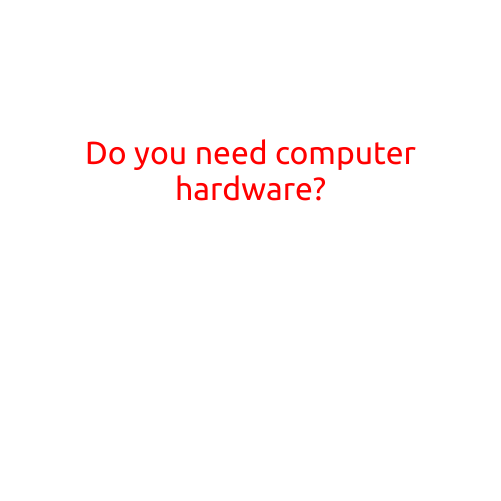
Do You Need Computer Hardware?
Are you considering purchasing a new computer or upgrading your current one? If so, you may be wondering whether you need any additional computer hardware. In this article, we’ll explore the types of computer hardware you may need and why you might need them.
What is Computer Hardware?
Computer hardware refers to the physical components of a computer system, such as the central processing unit (CPU), memory (RAM), storage devices, and input/output devices. These components work together to enable your computer to perform tasks and interact with you.
Types of Computer Hardware
- CPU (Central Processing Unit): The CPU is the brain of your computer, responsible for executing instructions and performing calculations. If you’re doing demanding tasks such as video editing, 3D modeling, or gaming, you may need a more powerful CPU to ensure smooth performance.
- Memory (RAM): RAM is temporary storage for your computer’s data and applications. It’s essential to have enough RAM (at least 8GB) to run multiple applications simultaneously without experiencing slowdowns.
- Storage Devices: Storage devices, such as hard drives or solid-state drives (SSDs), store your operating system, programs, and data. If you need to store large files or multiple operating systems, you may require additional storage capacity.
- Input/Output Devices: Input/output devices, such as keyboards, mice, and monitors, allow you to interact with your computer and view your work. If you need to perform tasks that require a lot of typing or mouse movement, you may want to invest in a higher-quality keyboard or mouse.
- Graphics Card: A graphics card is responsible for rendering images and video on your monitor. If you’re a gamer, graphic designer, or video editor, a dedicated graphics card can significantly improve performance.
When Do You Need Computer Hardware?
You may need computer hardware if:
- Your current computer is slow or outdated: If your computer is experiencing frequent slowdowns, crashes, or other performance issues, upgrading your hardware might be a good option.
- You’re doing demanding tasks: If you’re engaging in resource-intensive activities such as video editing, 3D modeling, or gaming, you may need more powerful hardware to ensure optimal performance.
- You need to store large files: If you’re working with large files, such as videos or graphics, you may need additional storage capacity to ensure you have enough space to store your data.
- You want improved performance: If you’re tired of waiting for your computer to load applications or perform tasks, upgrading your hardware can significantly improve your overall user experience.
Conclusion
While you may not need all of the computer hardware components listed above, having the right hardware can significantly improve your computing experience. By understanding the types of hardware available and when you may need them, you can make informed decisions about upgrading your computer to meet your specific needs and preferences.





